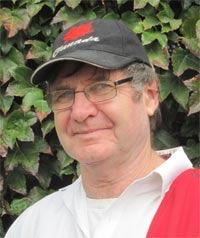Paul McKenna on 40 Years of Interfaith Work and Seeing the Other as Gift

After 20 years at Scarboro Missions and 20 years volunteering with other interfaith groups, Paul McKenna is retiring. We spoke to him about his 40 years of interfaith work, what excited him most about this work, and his hopes for the future as others carry on the work of interfaith dialogue and collaboration.
Hi Paul, how was it that your involvement in interfaith work entered into your vocation at Scarboro Missions?
I grew up in a generation when there weren’t many people involved in interfaith, so it’s always been a bit of a mystery to me how I have this inclination to interfaith. I think it’s a desire for a broader experience of things, including a bigger experience of God. Scarboro Missions works internationally and has been around for 100 years, and out of that experience has come exposure to many different religious and ethnic/cultural groups all over the world.
[The international work] explains Scarboro Missions’ involvement in anti-racism and cross-cultural global issues, interfaith dialogue and social justice and pluralism. That all really fits with who I am. It fits with that understanding of a bigger picture.
Did Scarboro Missions do interfaith work before you came on the scene?
Scarboro Missions was a Christian [Catholic] missions group working around the world, but [the international work] changed the organization, because you begin to see God as present in other religions and cultures. But they did not have a formal interfaith department.
I approached them about doing some interfaith work. My involvement there led to a growing department.
What excited you most about this work?
“God is too big to fit into one religion.” That’s a saying that floats around.
[Interfaith work] is a chance to grow as a person. Your experience of God increases or develops and you come to see the richness of other faiths and cultures. Other faiths and cultures are a bit of a treasure chest, but we need to be open to that. Throughout history and still in the present, there’s a lot of religious people who don’t see other religions and cultures as a treasure chest, who see them as a problem, as inferiors.
So the spiritual evolution for an interfaith person is to see the other as gift…that I’m fulfilled with different ethnicities and cultures and all they have to offer. There’s a fear that we’ll be distorted or polluted by this whole experience, but I would say it’s really the opposite. You become more fulfilled.
I think this kind of captures it:“It seems to me that the world’s religions are like siblings separated at birth. We’ve grown up in different neighbourhoods, different households, with different songs, stories, traditions and customs. But now, we’ve been reunited, and, having found each other after so many years apart, we look into each other’s faces and we can see the family resemblance. We’re back together again, and it’s very good.” - Richard Watts
I’ll give you another one that’s very good: "Dialogue is the art of conversation across boundaries of difference.” That’s by a woman named Sister Mary Boys.
What are you hoping to see in future as others continue to work in the area of interfaith dialogue and collaboration?
When I went to my first interfaith gathering in 1976, there were only one or two interfaith organizations in the Greater Toronto Area. Now there’s more than 80. And now the Parliament of World Religions is coming to Toronto in 2018…that’s more than 10,000 people from around the world, a global interfaith experience.
I’ve seen tremendous growth of the interfaith movement in my lifetime. That includes the youth, including the great work the [Canadian] Interfaith Conversation is doing. I’m seeing people getting involved and traditions getting involved that you wouldn’t expect to get involved. It’s really happening around the world. The numbers are staggering.
And now interfaith individuals and organizations are cooperating on just about every conceivable issue…everything from social justice to scholarship to spirituality to soup kitchens. I have every belief that the interfaith phenomenon, including the youth component, is going to continue to grow. As I see it, “inter-religion” is the future of religion.
And as we sit in the Greater Toronto Area, which some would argue is the most cosmopolitan city in the world, for us interfaith isn’t theory. The Parliament [of the World’s Religions] will not be an academic thing. It will be very much dealing with the problems in the world. So I’m really encouraged by that.
Would you have any advice for younger leaders who are working in interfaith groups, kind of like when you were starting out?
I was always looking for mentors, of course, which I managed to find. That’s one thing. Perseverance is another, because interfaith can start off as a romance, but it ends up being hard work like everything else because you have all those cultural conflicts and everything.
And confidence that young people have a lot to offer. I have a lot to learn from them.
Stay open, and stay with it, and “prepare for the gift.”
Rachel Baarda
November 24, 2017

